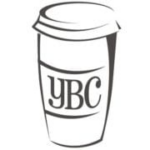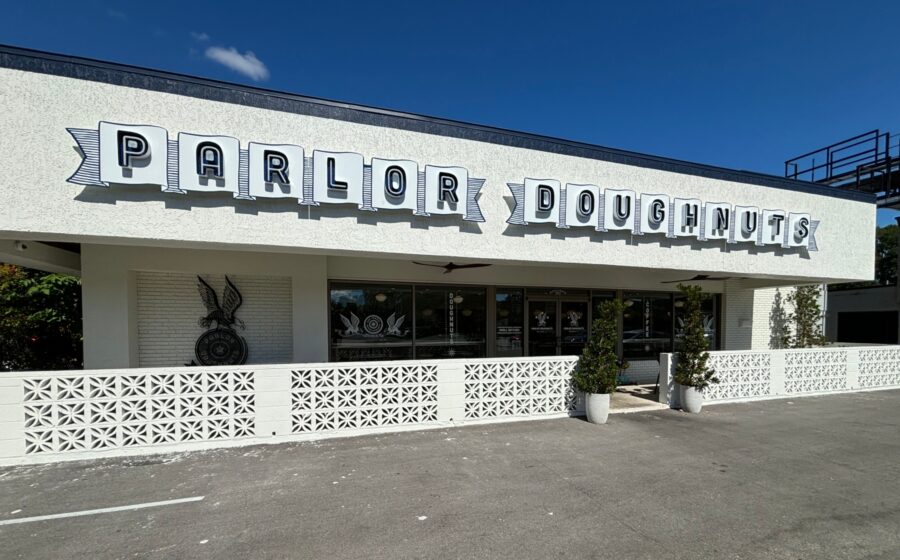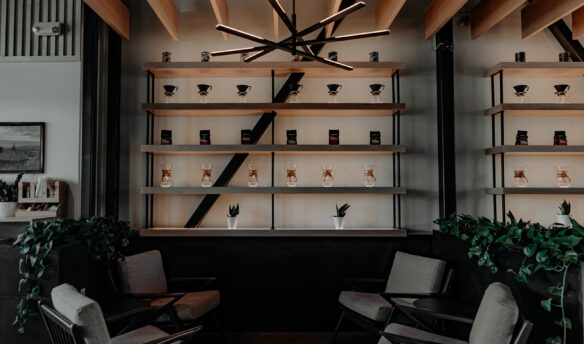This article is sponsored by our partners, Your Brand Cafe.
For many coffee shop owners, operating multiple locations is the ultimate goal. Doing so comes with certain advantages, such as sharing costs and supplies, enhancing brand awareness through new markets, and, if executed correctly, improving company profitability with additional sales channels.
However, the scrappy processes—like last-minute sprints to Costco for paper cups, or beverage recipes shared solely by word-of-mouth—that worked to build first and second cafes won’t necessarily work as businesses scale to five or more locations.
So how do coffee business owners grow to multiple locations while still maintaining product quality, brand standards, and operational efficiency? It all begins with documenting and implementing processes and partnering with the right vendors.
Document Everything
The story of Grit + Grind Coffee began in a trailer. Husband-and-wife co-founders Eric and Destiny Rowell started the regional franchise—which currently operates 10 locations in the Southeast and Utah, and has more in development—with one mobile location.
Eric Rowell credits their ability to expand to the repeatable systems and processes they had developed early on. “We both come from a background of documenting processes and teaching them to others, so creating standard operating procedures [SOPs], recipes, and other systems came naturally to us,” says Rowell.
When a new franchisee comes on board, Rowell provides a library of detailed resources, explaining everything from how to prepare a latte to how to order cups, lids, and other supplies from their partner vendors. Having ample information at their disposal ensures that all franchisees, whether brand-new or seasoned pros, understand how to operate their Grit + Grind Coffee venture in accordance with brand expectations. “To start out with, I have to document our expectations for our franchisees,” Rowell says.
Rowell and his team create videos and voice memos to make standards and expectations easy to navigate. “We like our SOPs to be innovative and convenient for the franchisee to access and use,” he says.
Parlor Doughnuts opened its first doughnut and coffee shop in Evansville, Indiana in 2019 to great success. “Our community just embraced us, and it exploded, frankly, and exceeded any and all expectations that our owner had,” says Joe Danks, chief operating officer at Parlor Doughnuts.
Things kept growing from there. “We then opened a large shop in Evansville, with a drive-thru, and continued to see just amazing support from our community,” he continues. “The concept just resonates in communities.” Now, Parlor Doughnuts is on track to have more than 100 franchise locations open before the end of 2025.
Parlor Doughnuts relies on a multitude of documented resources to guide franchisees through opening and operating new locations. “We have comprehensive training programs, manuals, and playbooks for new locations and their staff,” says Danks. “We want our franchisees to be able to go through our training program, have our training documentation, and know how to get from point A to point Z every step of the way, so they’re not having to try to figure that out on their own.”
Partner With Reliable Vendors
Consistency is a key concern as businesses grow. Ideally, customers should be able to visit any one of a brand’s locations and get the same-quality products and service. While documenting processes is a crucial starting point, both Danks and Rowell agree that it’s also imperative to partner with vendors who can consistently deliver a quality product to all of your locations.
Both Grit + Grind and Parlor Doughnuts work with PLUS Restaurant Solutions, an extension of Your Brand Cafe that provides multi-location food and beverage businesses with comprehensive inventory management, storage, and distribution services. “When our Your Brand Cafe customers are in growth mode and open location number three, five, 10, and so on, we offer them an opportunity to explore if our PLUS Restaurants Solutions services are right for their needs,” says Scott Sugar, director of sales at PLUS Restaurant Solutions.
Sugar says the company helps businesses ensure they’re able to keep up as they grow. “What we typically find is, as they’re in that growth mode, they have pain points that they have really no idea how to resolve in an efficient way to be able to keep up with their packaging sourcing and branding,” he says.
One of those pain points, he says, is storage. “A lot of the coffee shops we work with don’t have storage space, so we warehouse product for them and distribute it as needed, which typically is within the next business day.”
Danks says each Parlor Doughnuts franchisee works directly with PLUS Restaurant Solutions to order cups, lids, and boxes through its dedicated online order portal. “We want to control the vendors that they’re using and set up programs to make that relationship successful,” says Danks.
“By having an operations hub with an ordering portal, this allows the franchisor or the owner of the business to focus on the business,” adds Sugar. “We take those pain points off of their plate and address everything going on for their franchisees, from warehousing to ordering to distributing.”
Rowell says that partnering with knowledgeable vendors has helped him grow. “I’ve learned that I don’t need to know everything. Instead, I need to find experts in that field and partner with them, no matter if it’s my supplier for cups and lids or the roaster we work with for coffee beans.”
Anticipate Challenges With Each New Location
While growth may be the goal, achieving operational efficiency is never without its challenges.
Despite trying to document and streamline processes, Rowell says each franchise is still unique and presents different challenges. “What works for one coffee trailer may not work for 10 of our other partners,” he says.
He notes that many of these obstacles require learning on the fly. “When we started this path, I didn’t know how to run a franchise location,” says Rowell. “You don’t know what you need to know until there’s a fire to put out.”
But with a growing franchise base, Rowell says Grit + Grind partners can turn to one another for help. “Ultimately, we want to create an organizational culture where we support one another through these challenges,” he says. “There’s no one that’s part of our organization that has to go out there and do it on their own.”
Danks is also active with franchise owners. “We have small regional groups that I facilitate on a quarterly basis,” he says. “We meet and encourage our franchisees to get to know each other, and talk about some best practices and things that they’re seeing.”
One way Parlor Doughnuts has been able to expand so quickly is by not losing focus—Danks says he sees each new franchisee as a customer. “We recognize that our franchisees are our customers,” he says. “So we want to be readily available—whether that’s the middle of the night or on the weekend—to help them every step of the way.”

Sponsored by Your Brand Cafe
Your Brand Cafe provides high-quality disposable cups, sleeves, takeout containers, and more to coffee shops and restaurants. Stock up on basics or get custom branded supplies.









